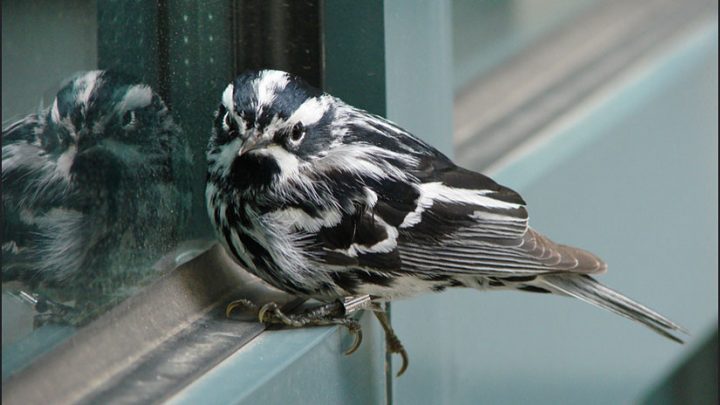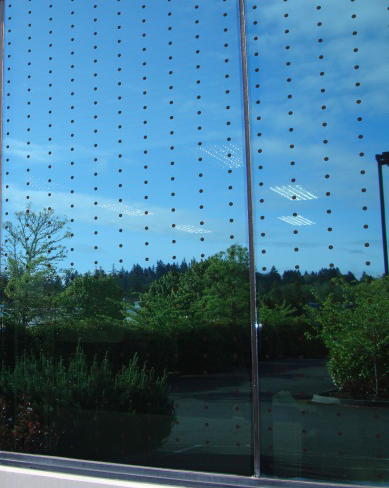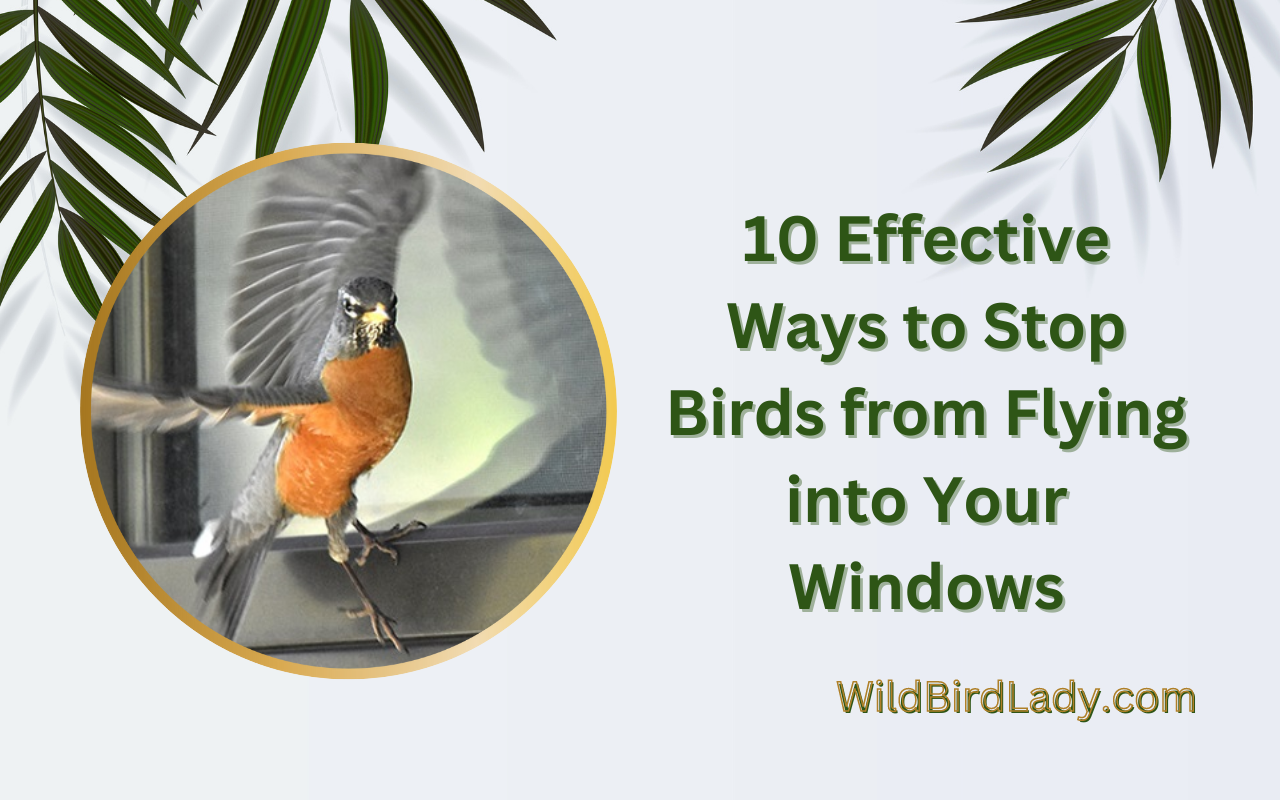🐦 Protecting your windows with bird tape, installing window decals, using netting or screens, placing colorful objects, using strip curtains or acrylic sheets, adding external shades or films, planting shrubs or trees, applying soap or chalk outlines, installing automated bird deterrent systems are some effective ways to stop birds from flying into your windows. Birds are a beautiful part of nature, but seeing them fly into windows and hurt themselves can be distressing.
Are you tired of hearing the awful sound of birds colliding with your windows? Not only do these collisions cause harm to our feathered friends, but they can also be quite alarming for us. Fortunately, there are many simple and effective ways to prevent birds from flying into your windows. In this blog post, we will explore 10 tactics that have been proven to be successful in minimizing bird strikes. From adjusting the placement of bird feeders to installing specific types of window films, you can make your home a safer and more bird-friendly place. Let’s take a closer look at these solutions and help protect our bird populations.

Source: www.allaboutbirds.org
The negative impact on the bird populations
Birds colliding with windows is a widespread problem that can have a negative impact on bird populations. Up to 1 billion birds die yearly from window strikes in the US alone. This indiscriminate killer takes fit and unfit members of a species population. When birds collide with windows, they often die from internal bleeding or bruising, especially on the brain. It is crucial to take steps to prevent window strikes to help protect bird populations and avoid causing unnecessary harm to these creatures. [3][4]
Ii. Reasons Why Birds Hit Windows
Many of us have witnessed birds accidentally hitting our windows. That sudden thud can be startling and heartbreaking at the same time. Understanding the reasons behind this phenomenon can help us take preventive measures.
Lack of perception of the glass as a barrier
To prevent birds from colliding with your windows, it’s important to understand why it happens in the first place. Birds often don’t perceive glass as a barrier and may mistake reflections or clear panes for open sky or foliage. This is especially common during mating and migrating seasons. To combat this, you can utilize strategies like applying non-reflective film or creating markings on the glass. Placing screens on windows or keeping feeders and birdbaths out of the danger zone are also effective ways to prevent collisions. With a few simple adjustments, you can keep your feathered friends safe. [5][6]

Reflections and Confused Birds
Birds mistake the reflection of the sky or surrounding trees from the windows for the actual sky or trees. This is especially true for territorial birds such as robins, who mistake the reflection of themselves in the windows for an intruder.
As they try to attack their reflections, they hit the windowpane.
To prevent birds from hitting windows due to reflections, it is essential to break the reflections. This can be done by sticking uv decals or outline stickers on the glass. Using external shading devices such as screens or light curtains can also reduce the reflection.
- Stick uv decals or outline stickers on the glass.
- Use external shading devices such as light curtains or screens to reduce reflection.
Migratory Birds
Migratory birds, who travel long distances, get disoriented by the lights at night. Artificial lights can lure them towards the windows, resulting in more collisions.
Turning off lights at night can help prevent migratory birds from hitting windows at your home or office.
- Avoid turning on lights at night.
- Use curtains or blinds to block the lights that can attract birds.
Insects And Bird Feeders
Sometimes, birds get attracted to insects that hit the windows. They peck at the insects and collide with the glass, causing injury. Similarly, bird feeders placed in front of windows might entice birds and cause collisions.
Avoid installing bird feeders near windows. Instead, place them away from the reach of birds. Keep windows clean to reduce insect accumulation.
- Place bird feeders away from windows to reduce collisions.
- Keep the windows clean to avoid insect accumulation.
Understanding these reasons can help us take preventive measures to ensure the safety of birds. Adapting some or all of these methods can help reduce bird strikes and protect our feathered friends.
Iii. Steps To Follow For Prevention
To prevent birds from flying into your windows, there are several steps you can take. Keep in mind that these strategies are most effective when used in combination with one another.
Remove potential causes
To prevent birds from flying into your windows, one effective strategy is to remove potential causes. This includes keeping bird feeders and birdbaths out of the danger zone within 3 to 30 feet from the windows. Taking down surrounding vegetation that reflects on the windows or blocking light from adjacent sources can also help reduce dangerous reflections. Identifying dangerous windows and removing these potential causes is important to decrease the chances of bird collisions and help protect bird populations. [11][12]
Positioning and Height of Bird Feeders
- Place bird feeders closer to the house, but not so close that birds will fly into windows.
- Make sure bird feeders are at least 30 feet away from windows or positioned closer than 3 feet from windows.
Window Treatments
- Use external shading devices such as awnings, shutters, or screens.
- Apply decals or stickers to windows to help birds identify that there is a barrier. Make sure that the distance between decals or stickers is 2-4 inches apart and that the shapes cover at least 70% of the glass.
Installing bird deterrents or ultrasonic sound emitters
Installing deterrents or ultrasonic sound emitters is a great way to prevent bird strikes without obstructing your view of the birds.
- Various designs available (flags, feathers on a fishing line, predator decoys)
- Birds can hear the emitted sounds
- Steers birds clear of windows
- Effective and non-obstructive solution
- Choose the option that suits your needs and budget
- Ultrasonic sound emitters are more expensive but highly effective
- Protects birds and prevents injury or death
Keep Your Windows Clean
- Keep windows free of smudges, dirt, and fingerprints, which can confuse birds and lead them directly into windows.
- Install window cleaners that reflect ultraviolet light.
Landscaping Solutions
- Plant trees and shrubs near windows to create a natural barrier between birds and your house.
- Create outdoor gardens or green spaces that are designed to attract birds away from windows.
Reduce Attractive Elements For Birds
- Avoid bird baths, reflective objects, and bright-colored garden decorations near windows.
- Minimize bird-friendly spaces like trimmed grass, mulched beds or shrubberies.
Use Tape or Decoy Animals to break up reflections
Another effective way to prevent bird strikes is by using objects like tape or decoy animals to break up reflections. By attaching strips of chart tape on the outside of your window, you can minimize transparency and reflections that birds mistake as a clear flight path. Alternatively, you can also use decoy animals or sun catchers to deter birds from flying directly at the window. While these solutions may not be the most aesthetically pleasing, they are affordable options that can greatly reduce bird collisions. Plus, you can always get creative and find fun designs that add to your home’s décor. [23][24]
Following these practical tips can help prevent birds from flying into your windows while still enjoying them in your garden. Remember to combine multiple prevention methods for the best results.
Iv. Helping Injured Birds
Iv. Helping Injured Birds.
Birds flying into windows can cause severe injuries. It’s not uncommon to find injured birds near windows. Here’s what you can do to help them:
- Check for injuries: Examine the bird and look for any obvious injuries. Look for signs of bleeding, broken wings, or other injuries. Take precautions, as some birds can be aggressive or scared when injured.
- Handle with care: Wear gloves and handle the bird with extreme care so as not to cause more damage. Place the bird in a cardboard box or a small animal carrier with ventilation holes and a towel at the bottom.
- Contact a wildlife rehab center: Look for a licensed wildlife rehabilitation center in your area and call them immediately. They will provide guidance on how to transport the bird and what to do until they arrive.
- Provide warmth and comfort: Keep the bird warm and comfortable by placing a heating pad underneath half of the box or carrier. Cover the box with a towel or blanket to reduce stress and calm the bird.
- Do not give food or water: Do not give the bird food or water unless advised to do so by the wildlife rehab center. The bird could choke or aspirate liquid into their lungs, causing more harm.
- Reduce window reflections: Prevent more birds from flying into windows by using window clings, screens, or netting to reduce reflections.
- Spread awareness: Educate your family, friends, and coworkers about the dangers of window collisions and how they can prevent them. Help spread awareness on social media and in your community.
Injured birds need professional help to recover and survive. Providing emergency care and transporting them to a wildlife rehab center can significantly improve their survival chances. Remember, every bird counts!
Frequently Asked Questions
What Is The Main Reason Birds Fly Into Windows?
Birds fly into windows because they don’t recognize the glass as a solid object.
How To Decorate Windows To Prevent Bird Strikes?
Applying stickers, decals, or sun-catching films on windows will help break up the reflection and reduce bird strikes.
Should I Put Up Netting To Prevent Bird Strikes?
Yes, the installation of nettings should be done properly to cover windows, balconies, and patios to prevent bird strikes.
Final Takeaway
As beautiful as birds are, they can pose a serious danger when it comes to flying into your windows. Not only can it be a threat to their well-being, but it can also cause damage to your home. Fortunately, there are a number of effective ways to prevent this from happening.
By incorporating these methods – such as using decals and installing screens on your windows – you can create a safe and welcoming environment for birds while protecting your property at the same time. Remember, taking action as soon as possible is important to prevent any potential harm to the birds and your home.
By implementing these simple steps, you can ensure a safe and happy coexistence with our feathered friends.
Latest Posts
The Ultimate List: Top 8 Best Birdwatching Podcasts for Avid Birders
Looking for the top birdwatching podcasts? Here are the eight best options to tune into today! Birdwatching can be a thrilling, immersive experience that brings...
Stop Squirrels in Their Tracks: 10 Effective Ways to Safeguard Your Bird Feeder Pole
To prevent squirrels from climbing your bird feeder pole, use squirrel baffles and slippery poles. Here are ten effective ways to keep squirrels from stealing bird food and damaging bird feeders. ...


